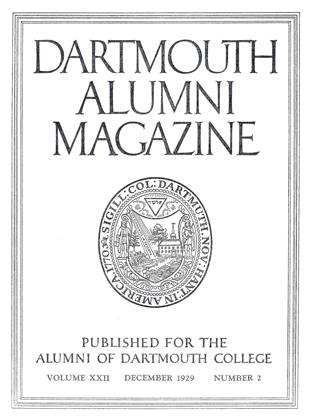The Birth of a New Science (Psychology)
If you would be a success in business, if you would hita baseball farther than anyone else, if you would write apoem that would put you on the same plane as the knownpoets of the world,—if you would do these and a thousandother successful things, you should call upon the mysticart of psychology to help you, according to many articlesin current magazines and according to advertisementsof many so-termed practictioners in this art. But Instructor Allen explains the business of teaching psychology,as it is, stripped of all the glamor which makes it adaptableas a good sales product. He also tells something of thegrowth and importance of the subject in college curriculumstoday.
PERHAPS no single department of instruction has felt its growing pains so keenly as has that devoted to understanding how and why we behave and misbehave: Psychology.
How many undergraduates realize the newness of this science is hard to determine. Graduates of twentyfive years ago certainly find present-day psychology very much of a revelation.
A search of the catalogues of Dartmouth College shows that it was not until 1882 that a course in psychological principles was offered. This was given under the department of Philosophy as "Philosophy 2," and was a required course for all seniors. The text book used was Porter's Elements of Intellectual Science. (A comparison of that textbook with those of the present day discloses many more differences than similarities.) Eleven years later, the college faculties divided the curriculum into "departments," and three courses were then given, whose subject-matter was psychological. Juniors were soon required to elect either psychology or logic.
Bit by bit, the subject-matter of what is now three separate departments became more and more specialized. A division came in 1900-1, when the department of Education and Psychology was formed. In 1910-11, Philosophy, Psychology, and Education appear in the catalogue as a division. The next year saw a psychological laboratory assembled on the third floor of Wilder Hall. In that academic year, seven courses in psychology were given; but not until 1915 was a man appointed to give his full attention to the teaching of psychology. Obviously the enrollment was small at first. At present the semester enrollment in all courses in the department is about 500 men. Nearly every one has had at least one course in psychology before he graduates.
 View Full Issue
View Full Issue
More From This Issue
-
 Class Notes
Class NotesCLASS OF 1923
December 1929 By Truman T. Metzel -
 Article
ArticleAlumni Associations
December 1929 -
 Article
ArticleAlumni Council Meets in New York
December 1929 -
 Article
ArticleCarnegie Report
December 1929 -
 Article
ArticleThe Dartmouth Indians
December 1929 By Eric P. Kelly -
 Sports
SportsThe Yale Epic
December 1929 By Phil Sherman









